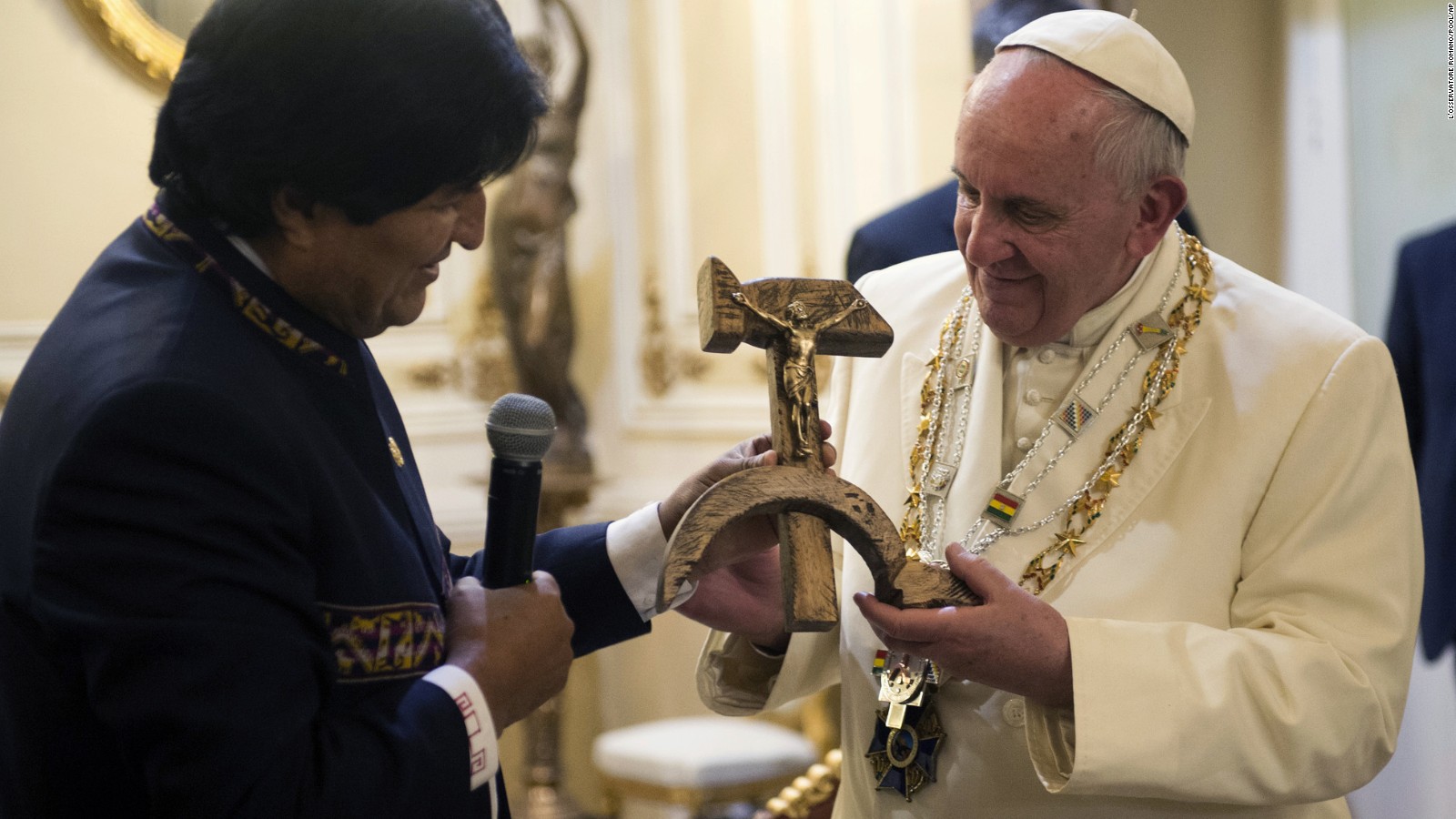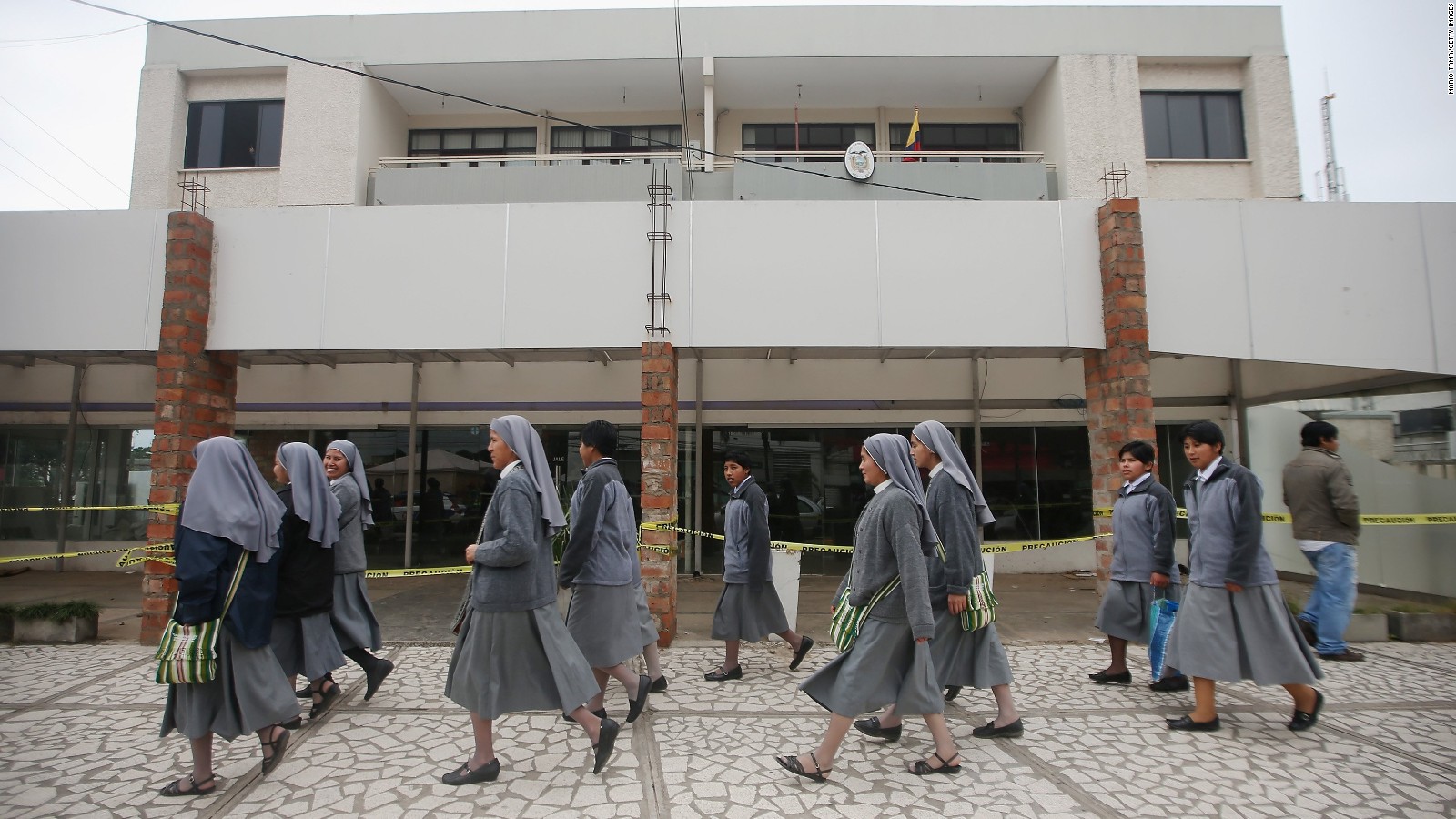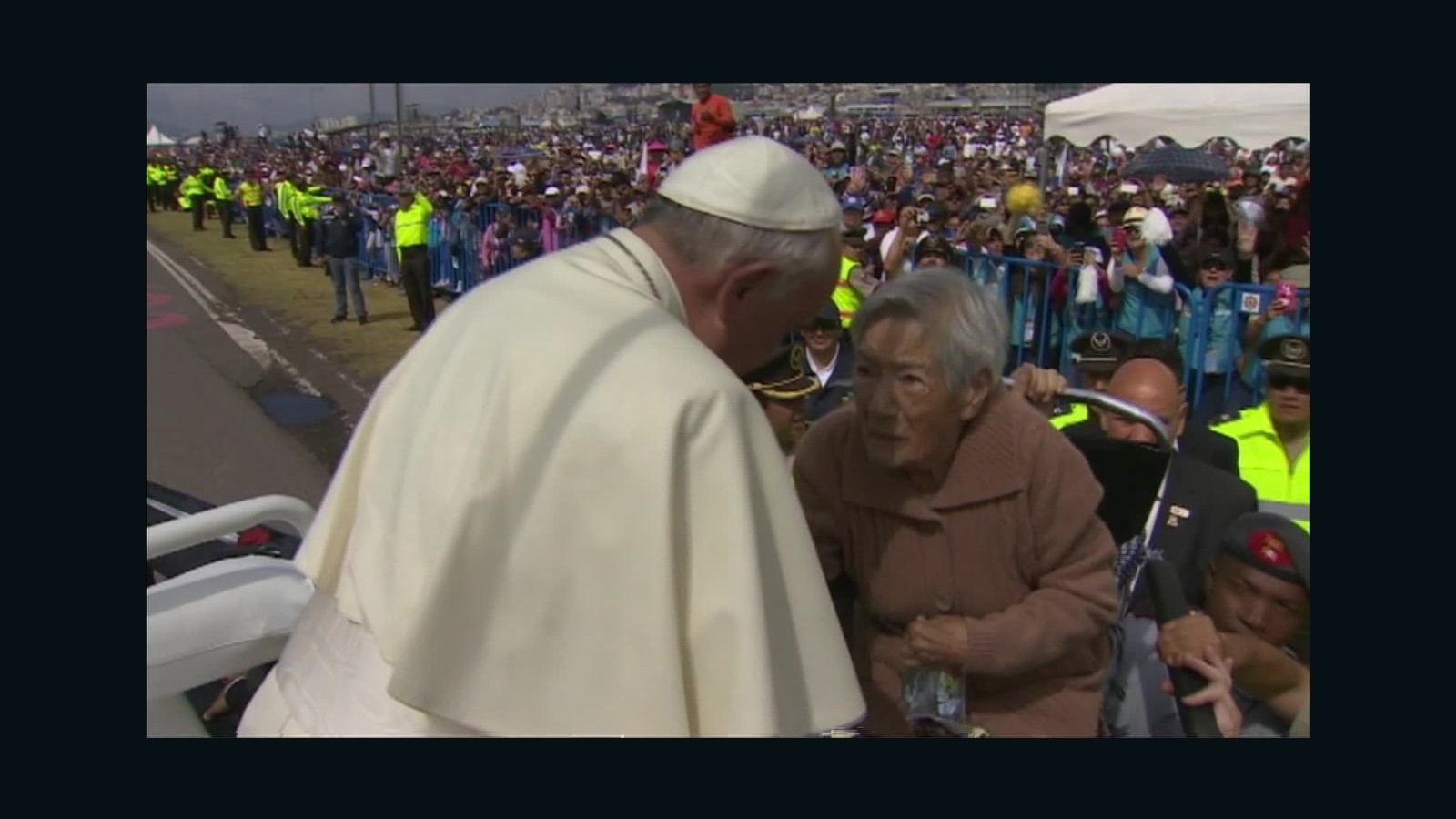Pope calls world leaders 'cowards'
Papal mass draws one million in Ecuador
(CNN)Pope
Francis delivered a hellfire-and-brimstone denunciation of modern
capitalism on Thursday night, calling the "unfettered pursuit of money"
the "dung of the devil" and accusing world leaders of "cowardice" for
refusing to defend the earth from exploitation.
Speaking
to a group of grassroots organizers in Bolivia, the Pope called on the
poor and disenfranchised to rise up against "new colonialism," including
corporations, loan agencies, free trade treaties, austerity measures,
and "the monopolizing of the communications media."
Here's what one prominent American priest had to say about the speech:
My copy of the Pope's speech may have more underlined sections than not. It was a pretty long, too, as even Francis admitted:
Here's are the Pope's 7 most pungent quotes:
1.
"This system is by now intolerable: farmworkers find it intolerable,
laborers find it intolerable, communities find it intolerable, people
find it intolerable ... The earth itself ... also finds it intolerable."
2.
"And behind all this pain, death and destruction there is the stench of
what Basil of Caesarea called 'the dung of the devil.' An unfettered
pursuit of money now rules. That is the dung of the devil."
3.
"Working for a just distribution of the fruits of the earth and human
labor is not mere philanthropy. It is a moral obligation. For
Christians, the responsibility is even greater: it is a commandment."
4. "It is not enough to let a few drops fall whenever the poor shake a cup which never runs over by itself."
5.
"I humbly ask forgiveness, not only for the offenses of the Church
herself, but also for crimes committed against the native peoples during
the so-called conquest of America."
6.
"The new colonialism takes on different faces. At times it appears as
the anonymous influence of mammon: corporations, loan agencies, certain
'free trade' treaties, and the imposition of measures of 'austerity'
which always tighten the belt of workers and the poor."
7.
"Our common home is being pillaged, laid waste and harmed with
impunity. Cowardice in defending it is a grave sin. We see with growing
disappointment how one international summit after another takes place
without any significant result."
Pope Francis also called the recent persecution of Christians a "genocide."
"Today
we are dismayed to see how in the Middle East and elsewhere in the
world many of our brothers and sisters are persecuted, tortured and
killed for their faith in Jesus. This too needs to be denounced: in this
third world war, waged piecemeal, which we are now experiencing, a form
of genocide -- and I stress the world genocide -- is taking place, and
it must end."
Below are some other interesting moments from the Pope's weeklong visit to South America.
A Communist crucifix
Pope
Francis celebrated Mass with nearly a million Bolivians in Santa Cruz
on Thursday. But the scene that has set a thousand tongues wagging is a
gift from Bolivian president Evo Morales.
On
Wednesday evening in La Paz, Morales presented Francis with wooden
crucifix laid atop a hammer and sickle, the Communist symbol conceived
during the Russian Revolution.
You can see the symbol in the photo below.

Bolivian
President Evo Morales presents Pope Francis with a gift of a crucifix
carved into a wooden hammer and sickle, the Communist symbol uniting
labor and peasants in La Paz, Bolivia, on July 8.
The
links and battles between Communism and the Catholic Church are an
extremely sensitive subject in Latin America, the Pope's home continent.
While he was an archbishop in Argentina, Francis tried to strike a
delicate balance between championing the poor and avoiding class
warfare.
According to reports,
Morales told Francis that the "Communist crucifix" was modeled on a
design created by the Rev. Luis Espinal, a politically active priest
murdered in Bolivia in 1980. (The Pope stopped and prayed at the site of
the shooting on Wednesday evening.)
It's unclear whether the Pope told Morales, "That's not right," or simply said: "I didn't know that."
In any case, Vatican spokesman Rev. Federico Lombardi had the final word:
"Certainly," he told reporters, "it will not be put in a church."
Francis gets the nun's rush
A visibly winded Pope Francis landed in La Paz, Bolivia -- one of the world's highest capitals -- on Wednesday.
Vatican officials say the Pope did not chew coca leaves, as had been widely discussed. But he did drink coca tea, another South American remedy for altitude sickness, on the plane ride from Ecuador to Bolivia.
(The Catholic Herald has a good explainer on coca, whose leaves are considered sacred by indigenous peoples.)
For
all the concern about altitude sickness, though, a Catholic nun might
have given Francis his most surprising moment when she rushed toward him
at La Paz Cathedral.
The Pope quickly recovered, and gave the nuns a blessing, as you can see in the video below.
It's another indication of just how excited South Americans are to welcome home the first pope from their continent.
In a speech to Bolivian
authorities later on Wednesday evening, the Pope continued to press the
big themes of his weeklong trip through three South American countries:
challenges to the family, economic fairness and environmental
protection.
Francis called for
dialogue between Bolivia and its neighbor, Chile, over access to the
Pacific Ocean (a complaint Bolivian President Evo Morales reportedly
mentioned to the Pope earlier on Wednesday).
He also said that Bolivia is at a "historic crossroads" and urged political, religious and cultural leaders to work together.
"In
this land whose history has been marred by exploitation, greed and so
many forms of selfishness and sectarianism, now is the time for
integration."
Coca leaves for El Papa?
Pope Francis landed in La Paz, Bolivia, on Wednesday afternoon, a city nearly 12,000 feet above sea level.
As
noted above, there had been a lot of discussion about how the
78-year-old pontiff, who has only one fully functioning lung due to a
childhood bout with pneumonia, will handle the extremely high altitude.
At least one Bolivian official suggested that he should chew coca leaves, a local and legal remedy in his host country.
Check out the video below by our Shasta Darlington, in which she asks people in La Paz what Francis should do.

Altitude sickness an issue for Pope Francis in Bolivia 01:49
A papal pep talk
Addressing priests and nuns in Ecuador on Wednesday, the Pope said he had prepared a speech -- but didn't want to deliver it.
Instead, the pontiff spoke spontaneously for about 30 minutes, in a speech that showcased his sprightly sense of humor.
He
teased nuns who would rather watch soap operas than care for the needy.
He joked that he doesn't remember quotes and Bible passages as well as
he once did. And he warned priests, and bishops for that matter, not to
fall prey to "spiritual Alzheimer's," a punchy phrase he has used quite
often in the last few years.
The word
that Francis kept coming back to is "gratuidad," mentioning it at least a
dozen times during the papal pep talk. Translated into English the word
is somewhat clunky: gratuitousness.
I asked a translator I've been working with a little more about "gratuidad." Is it common word in Spanish, I wondered?
It's
not, said Richard Singer, the translator, and I could see that he had
circled it in the Pope's prepared remarks. Singer said that he had
wanted to make sure it was correct and look up what, precisely, it
meant.
Literally, it means "something freely given," sort of like a "gratuity."
But unlike a tip for a waiter, "gratuidad" means not only a gift, but also one that's not necessarily deserved.
That
fit with a big theme of the Pope's message to nuns and priests:
Remember your roots, and don't think you're special just because you've
received a calling from God.
"You did not buy a ticket to get into the seminary," he told them. "You did nothing to 'deserve' it."
Embracing the elderly, talking selfies with the young
As
Pope Francis continues his trip through South America, it's clear that
he wants to particularly embrace three groups of people: the young, the
sick and the elderly.
As you can see in this video from Tuesday in Ecuador, that embrace is quite literal.

Woman in wheelchair carried to meet Pope 00:44
The Pope said he's often asked why he focuses so intently on what some Christians call the "least and the lost."
Read the Gospel, Francis answered on Tuesday, specifically Matthew 25.
In that passage, Jesus says that in the Last Days, Christians will be
asked whether they fed the hungry, clothed the naked, visited the sick.
"This is the heart of the Gospel," the Pope said.
Mr. President, don't drill in that rainforest
Also
on Tuesday night, the Pope took his eco-friendly message to the masses,
calling for a new system of global justice based on human rights and
care for the environment rather than economic profits.
"The
goods of the Earth are meant for everyone," the Pope said, "and however
much someone may parade his property, it has a social mortgage."
Francis'
call for environmental protection, a prevalent theme in his papacy,
came on the second full day of his weeklong tour of South America. He
was speaking to a group of civic leaders and indigenous people at San
Francisco Church in Quito, Ecuador's capital city.
Later
this week, Francis will visit Bolivia and Paraguay. Like Ecuador, both
countries are home to vast natural resources but also problems like
deforestation, pollution and widespread poverty.
In
recent months, indigenous groups have protested Ecuador's president,
Rafael Correa, saying that his promotion of drilling and mining near the
Amazon rainforest could ruin their ancestral homeland.
The Pope left little doubt about whose side he takes.
"The
tapping of natural resources, which are so abundant in Ecuador, must
not be concerned with short-term benefits," Francis said.
It
was interesting to see the Pope speak so specifically about his host
country's environmental policies. An apt analogy might be Francis coming
out against the Keystone Pipeline when he addresses the U.S. Congress
this September.



No comments:
Post a Comment